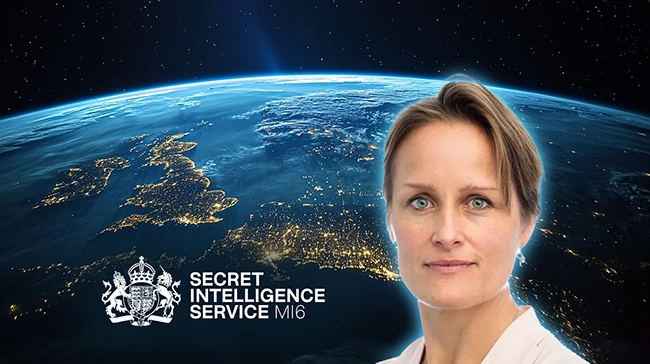Geostrategica Special Report June 19, 2025
Introduction
In a move that reflects a recalibration of British intelligence priorities, Blaise Metreweli has been appointed as the new Chief of the Secret Intelligence Service (SIS), more commonly known as MI6. A respected Middle East specialist with decades of operational and analytical experience, Metreweli’s appointment underscores the United Kingdom’s intensified focus on Iran and the broader regional order reshaped by ongoing geopolitical turbulence. This report outlines who Metreweli is, why his background matters, the legacy of MI6, and what this leadership change signals for future intelligence and security strategies.
Who is Blaise Metreweli?
Blaise Metreweli is not a household name, and that is by design. Known within government and academic circles for his deep expertise on Middle Eastern affairs—especially Iran, Iraq, and the Gulf states—Metreweli has built a reputation for blending field intelligence work with strategic policy insight. He spent a significant portion of his career stationed in embassies and covert positions across the Levant, Gulf, and North Africa.
His professional record includes:
Leading classified operations on Iran’s nuclear procurement networks.
Developing counter-intelligence strategies against Iranian-backed cyber threats targeting UK infrastructure.
Advising the Foreign and Commonwealth Office (FCO) on Persian Gulf risk assessment and diplomatic signaling.
His ascent through the ranks of SIS has been defined by a pragmatic yet assertive approach, favoring strategic disruption of hostile activities over reactive containment. He is widely respected among intelligence allies—particularly in Washington, Tel Aviv, and Paris—for his collaborative posture and operational credibility.
MI6: Mandate and Legacy
MI6 is the UK’s foreign intelligence agency responsible for gathering intelligence outside the British Isles. Officially known as the Secret Intelligence Service, it operates under the authority of the Foreign, Commonwealth & Development Office (FCDO). MI6 collaborates with domestic counterpart MI5 and the signals intelligence agency GCHQ, forming the UK’s “Intelligence Community.”
Historical Achievements
World War II: Played a critical role in deception operations and the recruitment of resistance networks in Nazi-occupied Europe.
Cold War: Ran pivotal HUMINT operations in the Soviet Bloc, with notable successes in East Berlin and Tehran.
Post-9/11 Era: Conducted intelligence collection and clandestine operations in Afghanistan, Iraq, and Syria against terrorist organizations.
Cybersecurity Integration: Recently expanded into cyber-espionage and digital infiltration of adversarial networks.
MI6 remains one of the most respected agencies globally, with a reputation for elite human intelligence (HUMINT) capabilities, long-term asset cultivation, and sophisticated counter-influence operations.
Why Now? Strategic Context
Metreweli’s appointment comes amid a volatile geopolitical environment:
Israel-Iran conflict: Intensified hostilities have exposed vulnerabilities in Western energy security.
Iranian cyber operations: Growing in sophistication and reach, with recent probes into British military logistics systems.
Global shift in alliances: The UK is navigating new strategic partnerships post-Brexit, requiring refined intelligence assessments.
In this context, appointing a seasoned Middle East operative signals a shift from generalist leadership to regionally specialized, forward-leaning command. The UK’s intelligence priorities are likely to tilt toward:
Enhanced covert capabilities in the Middle East.
Stronger HUMINT focus on Iran’s Revolutionary Guard and overseas proxies.
Tighter collaboration with U.S., French, and Gulf intelligence agencies.
Heightened monitoring of transnational threats linked to Tehran.
Forward Outlook: What to Expect
Blaise Metreweli’s leadership will likely usher in a more assertive SIS posture. Key expectations include:
1. Proactive Disruption Doctrine
Metreweli has long advocated for pre-emptive actions against perceived threats. We can expect more aggressive covert operations targeting Iranian assets abroad—particularly cyber units and logistical hubs.
2. Focus on Influence and Disinformation
With Iran’s regional influence campaigns growing, MI6 may expand its own psychological operations (PSYOPS) to counter Tehran’s narrative in Arabic- and Farsi-speaking media.
3. Operational Technology Integration
Metreweli is a known supporter of integrating AI and data-driven intelligence fusion into traditional HUMINT frameworks. Expect greater synergy between SIS and GCHQ on cyber-enhanced fieldwork.
4. Allied Intelligence Coordination
Under his leadership, MI6 is likely to increase interoperability with allied services, especially the CIA, Mossad, and DGSE, particularly in relation to Iranian nuclear activities, Syria, and Lebanon.
Conclusion
Blaise Metreweli’s elevation to MI6 Chief represents more than a personnel change—it marks a recalibration of British intelligence for a world increasingly defined by asymmetric threats, ideological rivalries, and hybrid warfare. His tenure is likely to push MI6 deeper into forward operations, with Iran firmly at the center of the UK’s intelligence focus.
As geopolitical risks evolve, Metreweli’s leadership will shape how the UK interprets and influences a rapidly changing strategic landscape—one operation at a time.
For Intelligence Partnership or Access to Full Geostrategic Briefings, Contact:Email: info@geostrategica.orgWeb: www.geostrategica.orgTwitter | LinkedIn | Telegram @Geostrategica

